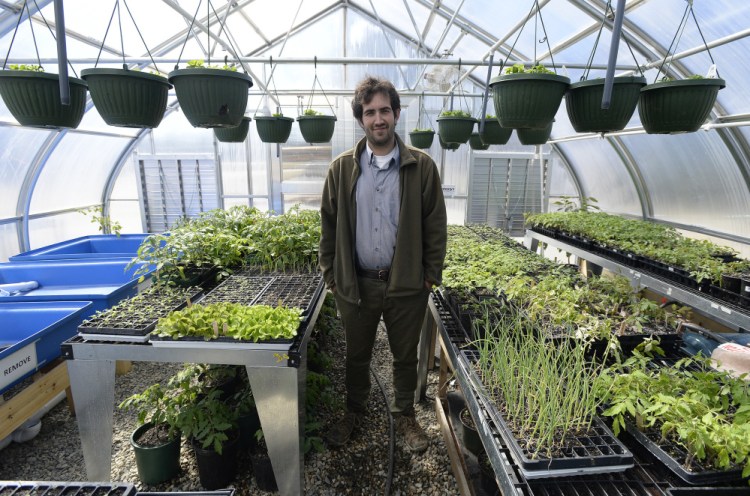There’s no landscaping or gardening store on Islesboro (year-round population 566 in the last census), but if residents need seedlings, Islesboro Central School will have that covered this spring – they’re already sprouting in the heated greenhouse.
There’s no Vietnamese restaurant on the island either, but the K-12 students who attend the school, all 95 of them, know what pho is because the school’s chef Jonathan (Jonny) Erskine puts it on his revolving, ever evolving, highly locally sourced menu.
Nor is there a college on the island, but students at Islesboro Central school can earn college credits while learning how to manage the school’s farm, which includes an aquaponics system designed to produce 110 pounds of tilapia annually and between 900 and 1,400 heads of lettuce. Getting the picture? This public school, the 2016 Source Award winner in the Teacher category, goes beyond a raised bed out front and everything comes full circle, cooked up to serve in a cafeteria where kids eat the vegetables they grew.
“My kids eat better than I do for lunch,” said island resident Shey Conover, a former school board member who moved to Islesboro 13 years ago as an Island Institute Fellow and ended up marrying an islander and staying.
“In terms of our school sustainability program, everything starts with horticulture and emanates out from there,” said Ryan Martin, the school’s horticulture teacher.
Martin took over the school’s Horticulture Program in 2012. (His predecessor, John Pincince had put in a well and planted the thriving apple, pear and peach orchard about 15 years ago.) Martin’s expansion has included overseeing construction of a second, heated greenhouse last summer. Under his direction students care for chickens (about 40 broilers), prune the orchard, run a table at farmers market seasonally and tap the area trees to make maple syrup. If they so choose, they can become Master Gardeners through a partnership with the Cooperative Extension. (Martin’s salary is underwritten by Mid-Coast School for Technology in Rockland, and he is also an adjunct professor at Kennebec Valley Community College.)
Islesboro Central School has served as a magnet school since 1997; about a quarter of the students come from mainland towns, riding the ferry out every morning. Technically the Horticulture program is for the high school students, where soil and crop science fulfills science requirements, but every student is exposed to it in some way.
“Like today I had a group of fourth- and fifth-graders come out, and I had them start some tomatoes from seed,” Martin said. “I make it a point to work with every grade as often as possible.”
“We all know how important it is to have kids outside, moving around, and engaged,” he added. “We have find new ways to reach this generation of kids because we compete with so many things for their attention.”

Acadia Calderwood, 15, Emily Martel, 12, and Mitiku Yeatts, 12, work in the greenhouse at the Islesboro Central School.
Although Islesboro Central School has been in the local foods game for many years, it is fitting that the school gets Source’s Teacher Award this year as it expands its focus on sustainability even further. The school is developing a new academic program focused on Sustainability Studies and on May 5 will host its first Sustainability Night, welcoming islanders to see projects completed by students in every grade and to eat some of Erskine’s food, which is legendarily good and made fresh from scratch every day, on the same budget as other school’s around the state.
“For him it is not some ideological thing,” Martin said. “It just makes sense to him.”
Traditionally, every Maine island struggles with some sort of food insecurity (including facing higher prices for food transported from the mainland), but on Islesboro, the next generation is addressing that problem directly.
“The school is one of the few sources of food production on the island,” Martin said. “And it’s going directly to the community. I am proud of that.”
Send questions/comments to the editors.




Success. Please wait for the page to reload. If the page does not reload within 5 seconds, please refresh the page.
Enter your email and password to access comments.
Hi, to comment on stories you must . This profile is in addition to your subscription and website login.
Already have a commenting profile? .
Invalid username/password.
Please check your email to confirm and complete your registration.
Only subscribers are eligible to post comments. Please subscribe or login first for digital access. Here’s why.
Use the form below to reset your password. When you've submitted your account email, we will send an email with a reset code.